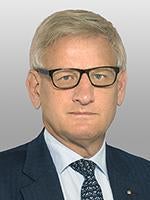1. Brexit and Elections in the UK and France
The legislative elections in the UK on June 8 resulted in what few observers expected: Theresa May, who was hoping to increase her majority in the house of Commons, instead lost it. In order to ensure a majority for the confidence vote in her new minority government, she had to secure the support of the Northern Irish Democratic Unionist Party (“DUP”). This came in exchange for a commitment to over ₤1 billion in public spending in the region (in addition to relaxing spending rules on another ₤500 million committed to by the last government).
Brexit was hardly discussed during the campaign, but the new political context, with the prime minister having lost her majority and much of her popularity, reopened the debate over the new relationship with the Union.
Meanwhile, the formal Brexit negotiations began as planned on June 19, even before the new British government had been confirmed, with a meeting in Brussels of the UK Secretary of State for Exiting the EU, David Davis, and his European Union counterpart, Michel Barnier. The next session will take place on July 17.
The atmosphere was made easier than anticipated by the acceptance by the British side, soon after the election, the European negotiators’ demand for a phasing of the talks – with the liquidation of the past being addressed before the future relationship. Indeed, this gives more time for the internal debate in the UK on the future relationship to reach a conclusion.
The first issue discussed was the rights of the EU citizens in the UK and of British citizens in the EU after Brexit about which each side has presented a position paper (here and here). The UK has not yet presented its position on the financial settlement, which the EU side hoped to discuss at the next meeting.
Meanwhile, the two-round elections for the French National Assembly took place on June 11 and 18. As foreseen, the audacious strategy of the new president, Emmanuel Macron, succeeded in giving a large majority to the new party he created just a year ago: “La République en Marche” elected 303 parliamentarians on a total of 577. However, 57.36 % of those allowed to vote abstained, the highest level in the history of the Fifth Republic. Edouard Philippe, a former supporter of the center right leader Alain Juppé, was confirmed as the prime minister.
The June European Council focused on security and defense, foreign affairs, climate change, economy, trade and migration. See the Council Conclusions here, and President Tusk’s remarks on the meeting here.
The European Council reaffirmed its commitment to cooperate at EU level to fight online radicalization, prevent and counter violent extremism, tackle terrorism financing, and improve information sharing and the interoperability of security databases.
The leaders also agreed on the need to launch an inclusive and ambitious “permanent structured cooperation” (“PESCO”) to strengthen Europe’s security and defense. Within three months, member states are supposed to agree a common list of criteria and commitments, together with concrete capability projects, in order to begin this cooperation. In addition, the European Council welcomed the Commission’s communication on a European Defense Fund and looked forward to its swift operationalization. It called for rapid agreement on the proposal for a European defense industrial development program.
2. Tech and Digital Single Market Policies
Therese Comodini Cachia has stepped down as Rapporteur on the proposed Copyright Directive file, as she is leaving her post as an MEP to take up a seat in the national parliament in Malta. The file has been taken on by Axel Voss (German MEP, center-right EPP), also a member of the lead Committee on Legal Affairs (“JURI”). He has stated that his aim is to strike a balance in the proposal between the interests of copyright holders and consumers. A vote in the Committee is tentatively scheduled for October 10, and the full plenary vote is expected by the end of 2017. Meanwhile, on June 14, 2017, Catherine Stihler MEP published her final opinion on the copyrights directive proposal on behalf of the European Parliament’s Committee on Internal Market and Consumer Protection (“IMCO”) committee – see here.
On June 15, 2017, the European Parliament adopted a report calling on EU and national authorities to ensure “fair working conditions and adequate legal and social protection for all workers” in the growing collaborative economy – see here. The report states that last year’s European Commission guidelines on the so-called “gig economy” did not bring “sufficient clarity” on how to apply EU legislation to this nascent field, which the MEPs found disappointing.
On June 9, the European Parliament’s Committee on Civil Liberties, Justice and Home Affairs (“LIBE”) released a draft report on the proposed ePrivacy Regulation. The general thrust of the changes proposed by the LIBE Committee was to increase privacy protections, including through a return to the privacy by default requirements. The deadline for the submission of amendments to this report was July 10, 2017. The plenary vote in the Parliament is scheduled for October 2017, though many MEPs feel that this timeline is too ambitious, given the complexity of the issues at stake.
On July 7, 2017, the Council formally appointed Mariya Gabriel as the new Commissioner for digital economy and society – see a press release here. The appointment takes effect immediately. This followed a June 20, 2017 European Parliament hearing to question the designated Digital Commissioner, Mariya Gabriel. Her responses to the MEPs’ questions have now been made public. She outlined her intention to launch new proposals on cybersecurity and data flows. She also emphasized her focus on the social aspects of digital policy. The MEPs then voted to approve her appointment on July 4, 2017.
The European Commission has fined Google €2,424,495,000 for breaching EU competition rules – see a Commission press release here, and a factsheet here. The Commission alleges that Google abused its market dominance as a search engine by giving an illegal advantage to another Google product, its comparison shopping service. Google must now end the conduct within 90 days or face penalty payments of up to 5% of the average daily worldwide turnover of Alphabet, Google’s parent company. The Commission is expected to conclude swiftly two other open investigations against Google.
3. Communication and Media Policies
The lead committee of the European Parliament on the new EU telecoms regulation (the Industry, Research and Energy committee, “ITRE”) has postponed its vote on proposals until September. This was expected to be ready for a committee vote in July. However, the large number of amendments proposed to the code has resulted in a further delay in the process. Once adopted by the committee, the code is expected to go up for a vote in the full European Parliament before the end of the year. The Electronic Communications Code was first proposed last September by the European Commission, following a review of EU telecom regulation – see here.
The Council finalised its position on the Audio Visual Media Services Directive (“AVMSD”) in late May – see the Council position here and a European Commission press release here. Trilogue negotiations, initially scheduled for June, began on July 10, 2017.
Roaming charges in the European Union no longer apply from June 15, 2017 – see a press release here. EU citizens traveling within the EU will be able to call, text and connect on their mobile devices at the same price as they pay at home. The three institutions held events to celebrate this change, which they claim as a major policy victory of this Commission’s term.
4. Energy and Environment Policies
On July 4, the European Parliament adopted a resolution calling for greater longevity and repairability, and raising concerns around planned obsolescence of devices and software. The Members of the European Parliament (“MEPs”) noted that a balance must be struck between innovation, consumer demand, and environmental protection, but raised concerns at the increasing volume of electronic waste and the perceived short lifespan of current electronic devices.
In its resolution, the Parliament called on the Commission to establish minimum resistance criteria for robustness, repairability and upgradeability for product categories, where this is practically possible. It recommended that these criteria be supported by standards developed by the European standardization organizations, CEN, CENELEC and ETSI.
In addition, the Parliament highlighted the potential of new business models to promote the overall durability of products – such as usage-based business models that treat “products as services”. In a parallel to U.S. debates on a “right to repair,” the Parliament cited “the importance of safeguarding the option of going to an independent repairer, for example by discouraging technical, safety or software solutions which prevent repairs from being performed other than by approved firms or bodies.”
Finally, the Parliament also called for the protection of consumers against planned obsolescence, for both devices and software. MEPs called for the Commission to define planned obsolescence, and consider establishing an independent system to test for in-built obsolescence in products. They also recommended that software updates be reversible, and for greater compatibility and upgradeability of software necessary for hardware devices to be kept in service. See the Parliament’s resolution here.
5. Internal Market and Financial Services Policies
On June 21, the Commission proposed a new Directive containing transparency rules for tax planning intermediaries such as tax advisors, accountants, banks and lawyers. The rules target schemes that use losses to reduce tax liability, rely on special beneficial tax regimes, or arrangements through countries that do not meet international good governance standards. Such intermediaries will be required to report the schemes they develop within five days, and before they are used by their clients. Where the intermediary cannot or will not disclose the advice – either because they are bound by privilege or secrecy rules, or because they are based outside the EU – the duty to report the scheme to the authorities will fall on the company receiving the advice. Where the advice is developed by in-house counsel, it will be for those implementing it to report it to the tax authorities. See the press release here, and Q&A here.
In its meeting of June 16, the Economic and Financial Affairs Council failed to agree a proposal that would allow Member States to lower the VAT rate for e-books, to bring it in line with paper books. Such agreement was expected, but the file, which must be agreed unanimously under a “special legislative procedure,” was blocked by the Czech Republic, in an attempt to gain leverage over another piece of legislation relating to VAT. (The Ministers’ disagreement can be seen in the video of the June 16 Council meeting – see here.) This other legislation – the “general reverse charge mechanism” (see that proposal here) – would enable Member States to run a pilot to collect VAT only at the last point of sale, rather than throughout the supply chain. The Council was prepared to allow a five-year pilot, but the Czech Republic wants this amended to allow a longer, 10-year pilot scheme. See the proposed Directive on the VAT applied to books, newspapers and periodicals here.
6. Life Sciences and Healthcare Policies
On June 29, the European Commission published its long awaited Communication on “A European One Health Action Plan against Antimicrobial Resistance”. The Action Plan outlines multiple initiatives the Commission proposes to foster the fight against antimicrobial resistance (“AMR”). The Action Plan is structured around three pillars: (i) making the EU the best practice region in terms of fighting AMR growth, (ii) boosting research, development and innovation, and (iii) shaping the global agenda by making the EU more influential on AMR internationally. The action proposed by the Commission includes: supporting the use of IT solutions in developing tools for diagnosing human and animal infections; supporting research into the development of new diagnostic tools in humans and animals to guide practitioners with regard to the use of antimicrobials; fostering the development of new effective preventive vaccines for both humans and animals; working with the European Medicines Agency (“EMA”) so support SMEs in their R&D efforts towards innovative or alternative therapeutic approaches for the treatment or prevention of bacterial infections; and supporting research into the development and assessment of interventions that prevent the development and growth of AMR in various settings, such as hospitals. The nature of these initiatives is still unknown, but the Commission’s follow-up to this announcement will create a number of opportunities for the industry to intervene and advocate its position. See the factsheet here, and the Commission’s press release here.
On the same day, the Commission also published its “EU Guidelines for the use of antimicrobials in human health”. The document provides guidelines to all healthcare actors, including the pharmaceutical industry. It recalls that the pharmaceutical industry is a key player in the fight against AMR, and recommends that the industry ensure monitoring of resistance and off-label use after the launch of new compounds in compliance with post-marketing obligations; ensure that financial incentives are compliant with the stewardship principles laid down in the Guidelines; abide by the rules that apply to advertising and marketing to healthcare professionals; and engage with national and international policy makers to support the shaping and development of new policies aimed at ensuring and promoting adequate antimicrobial prescribing and designing new reimbursement systems.
On June 22, the Heads of State or Government of the EU 27 agreed on the procedure for the relocation of the EMA and on revised criteria for selecting its new seat. The EMA is currently based in London, but will have to relocate after Brexit. The final decision on the EMA’s new location is now likely to be adopted before the General Affairs Council, to be held in November 2017. EU Member States wishing to host the EMA can apply until July 31, 2017.
On June 16, the EMA announced that the Clinical Trials Regulation (Regulation 536/2014, the “CTR”) will not come into force before 2019, instead of October 2018, as previously foreseen. The CTR establishes a centralized database and entry point for all information relating to the submission of clinical trial applications and data relating to EU clinical trials. The delay results from difficulties in establishing the IT infrastructure to enable this. Before coming into force, the proper functioning of the EU portal needs to be audited under the responsibility of the EMA. The CTR will then come into force six months after the Commission publishes the results of this audit.
On May 31, the EMA and the European Commission published a Q&A on regulatory guidance for pharmaceutical companies to prepare for Brexit. The guidance is addressed to both human and veterinary drug companies. This guidance follows the “Notice to Marketing Authorization Holders of Centrally Authorized Medicinal Products” published by the EMA and the Commission on May 2, 2017. The EMA stated it will issue further guidance documents to help pharmaceutical companies prepare for the UK’s withdrawal from the EU.
7. Trade Policy and Sanctions
On July 6, after long negotiations that began in 2013, agreement was reached “in principle” on an EU-Japan free trade deal. The outline plan was signed in Brussels, in a meeting between the Japanese Prime Minister, Shinzo Abe, and the European Commission president, Jean-Claude Juncker. It came on the eve of the annual summit of the G20 group of leading economies in Hamburg, on July 7 and 8.
The symbolic meaning of this timing was underlined by both sides: “I believe Japan and the EU are demonstrating our strong political will to fly the flag for free trade against a shift toward protectionism”, Abe told a joint news conference with Jean-Claude Juncker and the President of the European Council, Donald Tusk.
He added that the deal signified the creation of “the world’s largest free, advanced, industrialized economic zone”. Indeed, the agreement paves the way for trading in goods without tariff barriers between two of the world’s biggest economic areas. Both sides will also benefit from the removal of non-tariff barriers, such as incompatible product standards. Two of the most important sectors concerned are Japanese car imports in the EU and, for Europe, EU farming goods exports to Japan.
A full, workable agreement may take some time to conclude, even if officials insist the key snags have been overcome. President Juncker said he hoped the deal could take effect in early 2019. However, the agreement as currently envisaged will neither include a dispute settlement mechanism for investors, nor will it cover data flows.
In its meeting of June 22-23, the European Council again considered French proposals for an EU system to screen foreign investments (sometimes dubbed an “EU CIFIUS”, after the equivalent U.S. system). The leaders fell short of a consensus, calling instead for more reciprocity and better trade defenses.
French President Emmanuel Macron had wanted EU leaders jointly to call on the European Commission to examine “ways to screen investments from third countries in strategic sectors”, but that line did not make it into the final conclusions of the European Council summit.
Instead, the watered-down conclusions state that the leaders welcome an initiative by the Commission “to analyze investments from third countries in strategic sectors”, but leaves out any reference to the screening of acquisitions from abroad.
President Macron’s plan, which in particular is intended to prevent Chinese state-owned companies from buying up high-tech companies in the EU, had faced opposition in Northern and Eastern European countries, as well as inside the European Commission.









 />i
/>i

